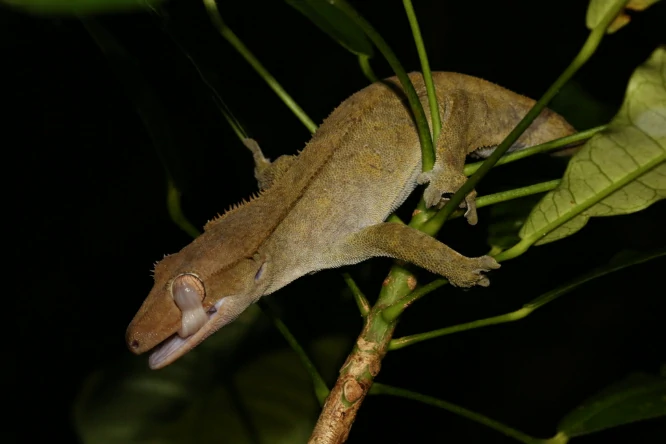If you’ve ever seen a tiny gecko climbing on a branch or a wall near a fruit tree, you might have wondered what it actually eats. Sure, we often see them snapping up insects, but do they ever go for fruit too?
Yes, some geckos (such as Crested geckos) eat fruit, but it really depends on the type of gecko and where it lives. Geckos mostly hunt insects for protein, but fruit gives them water and sugar. In places where bugs are hard to find, fruit can even become a regular snack.
Geckos are interesting little creatures. They’re mostly known for their sticky toes, hunting at night, and squeezing into tiny cracks.
But when it comes to food, they aren’t just bug eaters. Some geckos will try anything that looks edible, including soft fruits and nectar.
Geckos’ Diets Are Mostly Insect-Based
Most geckos eat insects. Crickets, moths, flies, beetles, you name it.
Many geckos sit quietly and wait, then snap up their prey in a flash.
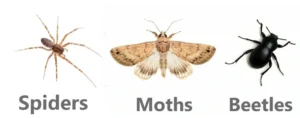
This insect diet gives them the protein and nutrients they need to grow, move, and reproduce.
Even though insects are their main food, geckos don’t always get enough water from bugs alone.
In dry areas, water can be hard to find, so they sometimes turn to fruit.
Soft fruits like bananas, mangoes, or papayas give them both sugar and water, which is really helpful in the wild.
Which Gecko Species Actually Eat Fruit?
Not all geckos eat fruit. Most insect-eating ones ignore it if bugs are around. But some do:
-
Crested geckos are the most famous fruit-eaters. They live in New Caledonia and love soft fruits and nectar. In captivity, many owners feed them fruit-based diets.
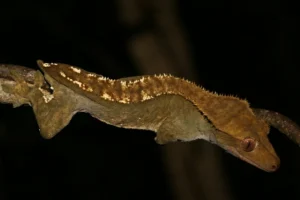
-
Day geckos from Madagascar and nearby islands also eat fruit and pollen in the wild. They mix it with insects, so they’re omnivores.
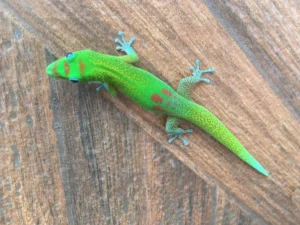
-
Other tropical geckos sometimes nibble on soft fruits or flowers if they’re easy to reach.
Fruit-eating mostly happens in humid, tropical areas where fruit and flowers are around all year. In drier places, geckos mostly stick to insects.
Why Fruit Is Helpful For Geckos
Fruit isn’t just a treat, it actually helps them in a few ways:
-
Hydration: Fruits are mostly water, which helps geckos stay hydrated, especially when it’s dry.
-
Energy: The sugar in fruit gives quick energy, useful when insects are hard to find.
-
Vitamins: Fruits give small amounts of vitamins and minerals that might be missing from an insect-only diet.
Picture a crested gecko in the wild. It climbs a branch at night and finds a fallen mango.
Eating a few bites gives it a quick burst of energy and water without chasing a cricket.
That small snack can make a big difference, especially for young or weaker geckos.
How Geckos Eat Fruit Without Teeth
Geckos don’t have teeth like mammals, so how do they eat soft fruit?
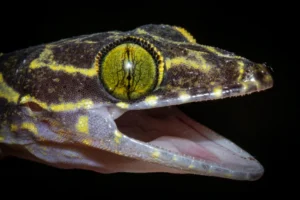
They use their sticky tongues to lap up soft parts. Crested geckos press their faces into the fruit and lick the juice.
Sometimes they scrape a little with tiny teeth at the edges, but mostly it’s lapping and licking.
Fruit is easy for them, it doesn’t need much chewing and is simple to digest.
Insects, on the other hand, have to be grabbed and swallowed whole.
Fruit gives them a break from hunting, especially on nights when insects hide.
Do Geckos Prefer Certain Fruits Over Others?
Geckos do have favorites. They like soft, sweet, watery fruits. Some of them are:
-
Mangoes
-
Bananas
-
Papayas
-
Peaches
-
Nectar-rich fruits and flowers
Hard or sour fruits usually aren’t appealing. Geckos are sensitive to texture and avoid anything too tough to lick.
This is why fruit-eating mostly happens in tropical areas, soft, juicy fruits are everywhere there.
How Fruit Affects Geckos In Captivity
If you keep geckos as pets, knowing their fruit habits is useful. For crested geckos, fruit diets are often the main food, with insects added for extra protein.
Many owners feed a mix of pureed fruit, commercial fruit gels, or occasional live insects.
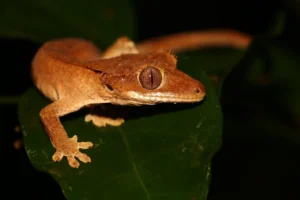
Day geckos also benefit from fruit and nectar. Small pieces of soft fruit, fruit purees, or pollen supplements copy what they’d find in the wild.
Just don’t give too much fruit without protein, insects or special diets are still important for healthy growth.
Can Fruit Replace Insects In A Gecko’s Diet?
Fruit alone isn’t enough for most geckos. Protein from insects is needed for:
-
Muscle growth
-
Making eggs
-
Immune system health
Even fruit-loving geckos need bugs sometimes. In the wild, insects are always part of their diet, even when fruit is available.
Fruit just adds to their diet rather than replacing it.
How Geckos Find Fruit In The Wild
Geckos rely on their senses to find food. Their eyesight works well in low light, so they can see fruit and insects at night.
Some geckos have a strong sense of smell, which helps them find ripe, sweet fruit.
A wild crested gecko might climb down a branch at night, drawn by the smell of a fallen papaya.
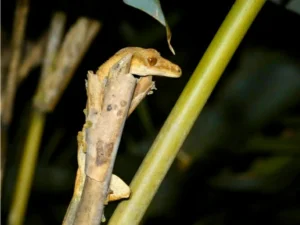
It tastes the soft pulp, licks the juice, and moves on to the next snack.
Fruit is a convenient, energy-packed bonus that’s easy to find without hunting.
Risks Of Eating Fruit For Geckos
Fruit is useful, but there are some risks:
-
Overripe or fermented fruit can make geckos sick if eaten too much.
-
Pesticides or chemicals on fruit can be dangerous near humans or in captivity.
-
Too much sugar can cause problems if protein is missing.
In the wild, these risks are small because geckos usually pick fresh fruit that’s naturally fallen, and insects still make up most of their diet.
What Fruit-Eating Tells Us About Gecko Behavior
The fact that some geckos eat fruit shows they’re flexible. They’ll use whatever food is available.
This helps them survive in different places, like forests, gardens, or even cities.
It also shows a bit of intelligence. Geckos balance hunting insects with fruit, making sure they get enough water and energy without wasting effort.
Watching a gecko enjoy fruit feels like seeing a tiny, careful strategist at work.
Do All Pet Geckos Enjoy Fruit?
Not always. Even in fruit-eating species, each gecko has its own likes and dislikes. Some crested geckos might ignore banana but happily lick mango pulp.
Others prefer insects or gel diets.
Pet owners usually figure this out by watching and trying different foods. It can be fun, each gecko has its own personality.
Can Geckos Survive Without Fruit?
Yes. Most geckos can live on insects or commercial diets alone. Fruit isn’t required, but it helps sometimes:
-
When insects are scarce during dry seasons
-
For extra hydration in dry areas
-
As a quick energy boost
In these cases, fruit isn’t just a treat, it can help them survive.
How To Offer Fruit Safely To Pet Geckos
If you want to give fruit to a pet gecko, follow some simple rules:
-
Pick soft, ripe fruit with no chemicals
-
Offer small amounts first to see if the gecko likes it
-
Mix fruit with insects or commercial diets for balanced nutrition
-
Avoid fruit that’s sour, hard, or fermented
For crested and day geckos, pureed fruit is often mixed with calcium and vitamins to copy wild nutrition.
Watching a gecko lap fruit can be really entertaining, they’re delicate, careful eaters, almost like tiny toddlers exploring new tastes.
How Fruit-Eating Shows Geckos’ Adaptability
Fruit-eating geckos show how animals adjust to their surroundings. Bugs aren’t always easy to find, so using fruit gives them an advantage.
It’s a small behavior, but it shows how even tiny animals make smart choices about food, energy, and hydration.
Geckos aren’t just bug hunters, they’re flexible feeders who use whatever nature gives them.
Watching them enjoy a bit of fruit gives a glimpse into a world where survival takes clever thinking.
Conclusion
So, do geckos eat fruit? Yes, but mostly in species that live in humid, tropical areas like crested and day geckos.
Fruit isn’t the main food for most geckos, but it gives water, sugar, and vitamins when insects are scarce.
In captivity, fruit can be a helpful addition, but protein from insects or special diets is still very important.
Hi, my name is Ezra Mushala, i have been interested animals all my life. I am the main author and editor here at snakeinformer.com.

